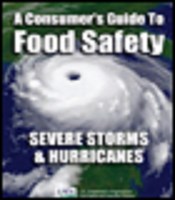Posted by Catherine Cochran, Public Affairs Specialist, Food Safety and Inspection Service, on October 26, 2012 at 3:58 PM
Hurricane Sandy could bring wind, flooding, heavy rain and possibly snow to the East Coast, and the Food Safety and Inspection Service urges people to take steps now to ensure they have access to safe food. Power outages and flooding that often result from weather emergencies compromise the safety of stored food, and planning ahead can minimize the risk of foodborne illness.
The publication “A Consumer’s Guide to Food Safety: Severe Storms and Hurricanes” can be downloaded and printed for reference during a power outage. FSIS’ YouTube video “Food Safety During Power Outages” also has instructions for keeping frozen and refrigerated food safe.
FSIS will provide relevant food safety information as the storm progress from its Twitter feed @USDAFoodSafety. To get tweets about food recalls and weather-related food safety issues affecting just your state, follow @XX_FSISAlert, replacing XX with your state or territory’s postal abbreviation.
Steps to Follow to Prepare for a Weather Emergency:
- Use appliance thermometers in your refrigerator and freezer to help determine if food is safe during power outages. Refrigerator temperature should be 40° F or lower and the freezer should be 0° F or lower.
- Freeze refrigerated items such as leftovers, fresh meat, and poultry that you may not need immediately—this helps keep them at a safe temperature longer.
- Freeze containers of water for ice to help keep food cold in freezer, refrigerator, or coolers in case of power outage. You can also use melted ice for drinking water.
- Purchase or make ice cubes and freeze gel packs in advance.
- Plan ahead and know where to purchase block ice and dry ice, just in case.
- Have coolers on hand to keep the refrigerator food cold in case the power is out for more than 4 hours
If the Power Goes Out:
- Keep the refrigerator and freezer doors closed as much as possible.
- A refrigerator will keep food cold for about 4 hours if you keep the door closed.
- A full freezer will keep its temperature for about 48 hours (24 hours if half-full)
- If the power is out for an extended period of time, buy dry or block ice to keep the refrigerator as cold as possible. Fifty pounds of dry ice should keep a fully-stocked 18-cubic-feet freezer cold for two days.
When the Power Is Restored:
- Check the temperature in the refrigerator and freezer. If the thermometer reads 40° F or below, the food is safe.
- If no thermometer was used in the freezer, check each package. If food still contains ice crystals, it’s safe.
- Discard any perishable food (such as meat, poultry, fish, soft cheeses, milk, eggs, leftovers and deli items) that have been kept in a refrigerator or freezer above 40° F for two hours or more.
- Never taste food to determine its safety!
- When in Doubt, throw it Out!
For more information check out the Food Safety and Inspection Service’s fact sheet, Consumer’s Guide to Food Safety: Severe Storms and Hurricanes, or listen to our podcast here.





